Acid reflux, sometimes also referred to as gastroesophageal reflux disease (GERD), results from stomach acid flowing back into the esophagus, which causes heartburn —a burning sensation in the chest.
Bloating, nausea, regurgitation, and an acidic taste in the mouth are typical symptoms. The development of gastroesophageal reflux disease (GERD) from chronic acid reflux can result in severe discomfort and possible consequences.
Many individuals choose natural therapies to treat acid reflux and frequently see milk as a go-to remedy for heartburn relief. They believe milk temporarily neutralizes acidity by coating the esophagus. The usefulness of milk in treating acid reflux is still up for discussion, though. While some people’s symptoms improve, others worsen.
Does milk assist with acid reflux, then? The sort of milk and each person’s tolerance will determine the response. Let’s examine the research behind using milk to treat acid reflux and the most effective ways to incorporate it into your diet.
Read More: Acid Reflux vs. Heart Attack: How to Tell the Difference
Common Causes of Acid Reflux
- Choices in Diet
Some foods and beverages can aggravate acid reflux symptoms, leading to GERD by relaxing the lower esophageal sphincter (LES) or increasing stomach acid production. Typical offenders include:
- Hot sauces, chili peppers, and spicy foods are examples of spicy foods.
- Citrus fruits, tomatoes, and dishes made with vinegar are examples of acidic foods.
- Fatty or any fried food slows down digestion and puts more strain on the lower esophageal sphincter.
- Having too much Weight
Being overweight, especially around the abdomen, puts extra strain on the stomach and LES, increasing the risk of acid reflux and gastroesophageal reflux disease (GERD).
- Getting Pregnant
Acid reflux during pregnancy, particularly in the third trimester, can be caused by hormonal changes and increased stomach pressure. Some pregnant women may experience chronic acid reflux and need to manage it carefully.
- The Hiatal Hernia
A hiatal hernia occurs when a portion of the stomach pushes into the chest cavity through the diaphragm. This anatomical anomaly, which weakens the lower esophageal sphincter, makes acid reflux easier.
- Medicines
Some drugs, including sedatives, blood pressure medications, and pain relievers like ibuprofen and aspirin, can relax the LES or irritate the esophagus.
- Anxiety
Although stress does not cause acid reflux directly, it can exacerbate symptoms and lead to poor eating habits that aggravate reflux.
- Smoking
Smoking increases the risk of gastroesophageal reflux disease (GERD) by harming the LES and decreasing saliva production, which is essential for neutralizing stomach acid.
Read More: Can Acid Reflux Lead to More Serious Health Issues? What You Should Know
How Does Milk Help in Acid Reflux?

Milk and other dairy products can help control heartburn symptoms in some situations. Some people believe this occurs because milk coats the esophageal lining. It may reduce the symptoms of heartburn and esophageal discomfort. Additionally, milk may be beneficial due to its high calcium content, which might decrease stomach acidity.
Foods heavy in fat, however, might exacerbate heartburn symptoms. Low-fat milk is a better choice for treating heartburn.
Milk has numerous health benefits beyond helping with heartburn. It has essential minerals, including protein and calcium.
Does Milk cause Acid Reflux?
The effectiveness of milk in treating acid reflux is debatable; opinions vary on whether it relieves symptoms or worsens them. People have long believed that milk alleviates acid reflux by temporarily neutralizing stomach acid and coating the esophagus. In certain people, the calcium in milk may also help digestion and lessen acid production.
However, not every kind of milk functions similarly; some may soothe reflux, while others worsen it. Whole milk and high-fat dairy products can relax the lower esophageal sphincter (LES), which prevents acid from escaping into the esophagus and exacerbates reflux symptoms. However, plant-based or low-fat milk, like oat or almond milk, is frequently better tolerated.
Read More: Best Ways to Use Yogurt for Acid Reflux
Best Types of Milk for Acid Reflux Relief
Certain types of milk and plant-based alternatives can help soothe acid reflux and support better digestion, such as:
1. Goat’s Milk

The milk of goats is beneficial for the body as it contains a low amount of fat and is considered easy to digest. However, fresh, organic, unprocessed goat’s milk is essential for better results. You can drink one glass of goat’s milk daily to keep fit.
2. Almond milk

Almond milk is a popular dairy-free substitute that may help ease acid reflux. Because it has less fat than whole milk, it is less likely to cause acid formation. Almond milk is also naturally alkaline, which helps counteract stomach acid and relieve heartburn. Because of its silky texture, it can help coat the esophagus, lessening acid reflux irritation. Almond milk is a mild, gut-friendly choice for many people with lactose intolerance or dairy sensitivity.
Read More: Best Ways to Use Apple Cider Vinegar for Acid Reflux
3. Soy Milk
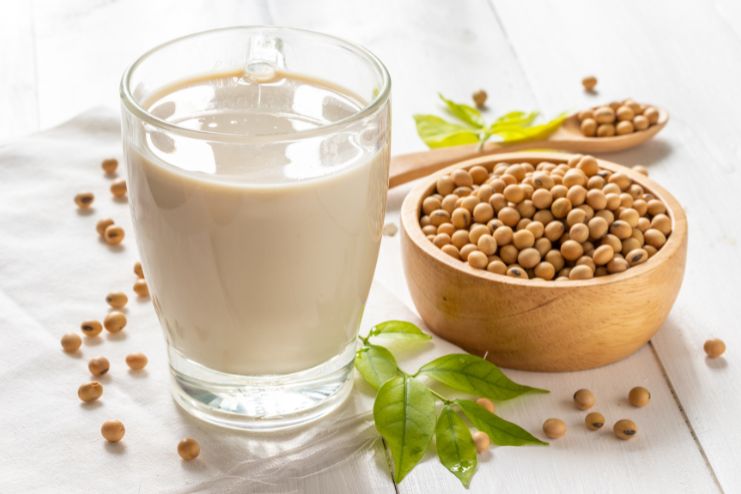
Soy milk may be a very good choice for people with acid reflux as a plant-based, low-fat substitute for dairy milk. Unlike whole milk, its decreased fat level helps avoid the overproduction of acid. However, it’s crucial to introduce soy gradually and monitor symptoms because some people have soy allergies or may have digestive issues. Since extra sugars occasionally exacerbate acid reflux, choose unsweetened soy milk instead.
4. Oat Milk
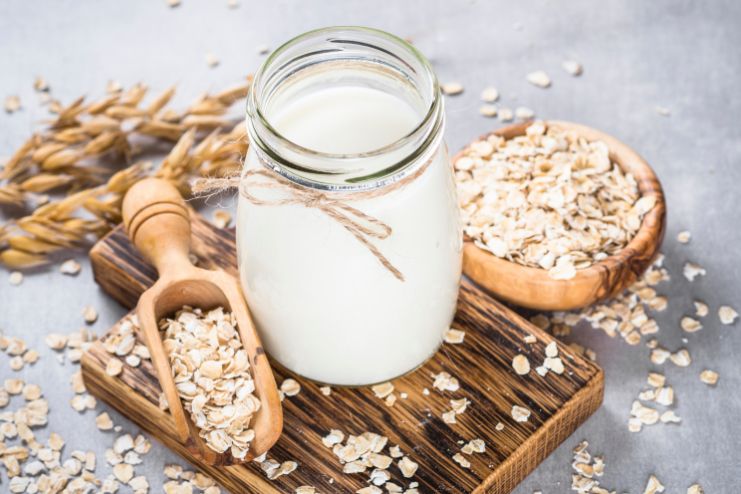
One low-fat, dairy-free option that might help control acid reflux is oat milk. It’s naturally high fiber content promotes a healthy digestive system and may lessen acid accumulation. Its light texture makes it less prone to cause reflux symptoms than whole milk. Unsweetened oat milk is the best option for avoiding extra sugars that could exacerbate acid reflux.
5. Coconut Milk
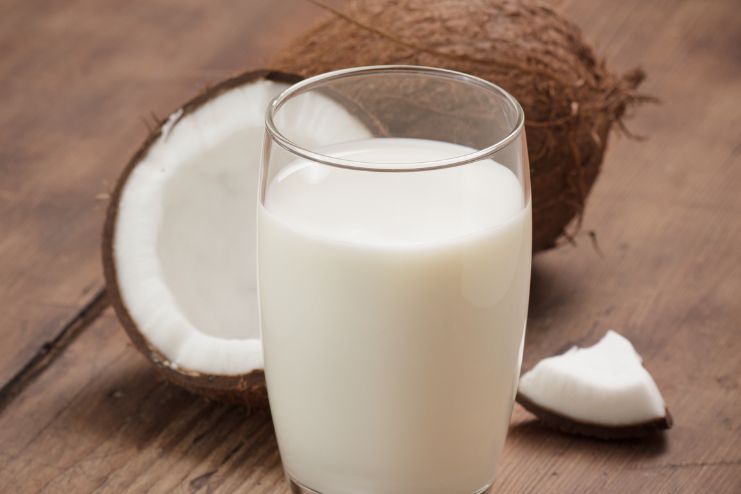
Coconut milk, a creamy, dairy-free substitute, contains lauric acid, which has anti-inflammatory and calming effects on the digestive tract. However, due to its high-fat content, some people may get acid reflux. Choose unsweetened coconut milk to reduce risks because extra sugars could worsen reflux symptoms.
Read More: Best Foods to Eat Before Bed for Deep Sleep & Muscle Recovery
6. Plant-Based Yogurt
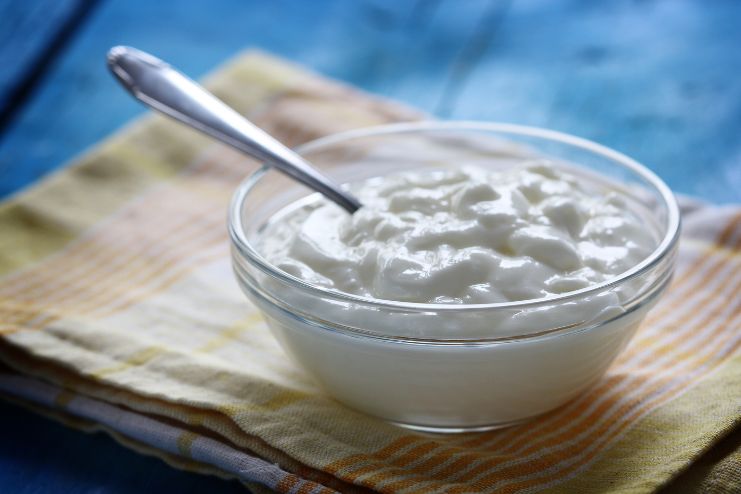
Almond, coconut, or oat milk-based plant-based yogurts provide a dairy-free substitute that could aid in treating acid reflux. Probiotics, which promote gut health and facilitate digestion, are abundant in these yogurts. It’s crucial to choose unsweetened types because extra sugars could make or cause acid reflux symptoms.
Not every alternative will be effective for everyone, so it is critical to pay attention to your body’s needs and consult your healthcare professional to determine which choice is ideal for you.
Tips and Precautions While Using Milk For Acid Reflux
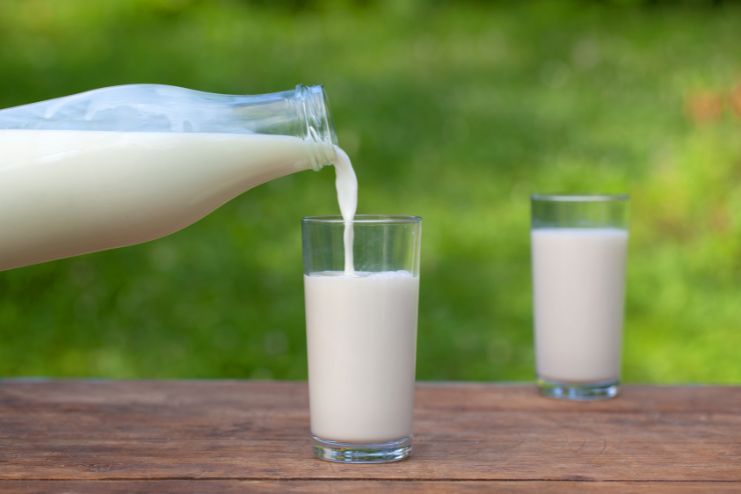
You can get the best results by following the tips and precautions while using milk for acid reflux.
- Choose goat’s milk or skim milk instead of cow’s milk.
- If you have lactose intolerance, avoid using milk for heartburn.
- Always choose organic, not minimally processed, milk that is available locally.
- Milk can cause food poisoning when it has crossed its expiration date. Therefore, always choose fresh milk.
- A lack of sleep may also cause heartburn. It is essential to get 8 hours of sleep daily.
- Try to perform yoga, meditation, or breathing exercises to treat stress, which can also cause acid reflux.
- Consult with your doctor before starting to consume milk for acid reflux.
Read More: Gut Health Hacks: The Best Morning Foods to Kickstart Digestion
Alternative Natural Remedies for Acid Reflux
Baking Soda: Sodium bicarbonate, a standard natural alkaline in your kitchen, helps relieve heartburn by neutralizing excess stomach acid.
Aloe Vera: Products made with aloe vera syrup or juice have demonstrated potential in preventing heartburn.
Ripe Bananas: Meals high in potassium, such as alkaline meals, may help offset the irritant effects of stomach acid.
Turmeric/Curcumin: Products that include turmeric and curcumin, a curry spice, have demonstrated promise in preventing heartburn.
Honey: A pilot study found that honey reduced the physical symptoms and effects of GERD, but more research is required.
Licorice Root: By producing more mucus, licorice may shield the esophagus from harm. Special processing eliminates a material that may have harmful side effects.
When to See a Doctor for your Acid Reflux
Acid reflux is normal occasionally, but if it continues or worsens, it could be a sign of gastroesophageal reflux disease (GERD). If you have chest pain, difficulty swallowing, heartburn more than twice a week, or a chronic sore throat, consult a doctor. Prolonged acid reflux raises the likelihood of more serious health problems by causing difficulties like Barrett’s esophagus, ulcers, and esophagitis.
A physician can assist in identifying the underlying cause if over-the-counter antacids and home therapies only offer short-term relief or ultimately cease to be effective. Developing a long-term treatment plan, which may involve prescription drugs, dietary adjustments, or lifestyle changes, requires a medical diagnosis.
In extreme situations, doctors may recommend surgery to prevent further esophageal damage. Seeking early medical attention can help manage symptoms effectively, improve quality of life, and prevent serious complications linked to untreated acid reflux.
Read More: 10 Ways Prevent To Stomach Bloating- Causes and Remedies
Conclusion
While milk may help some people with acid reflux, it can also worsen symptoms for others. Selecting the proper kind of milk is crucial. While whole milk and high-fat dairy might cause reflux by relaxing the lower esophageal sphincter (LES), low-fat dairy, almond, oat, or soy milk may help balance stomach acid.
But milk alone isn’t sufficient to relieve acid reflux. A well-rounded strategy incorporating portion control, lifestyle modifications, and nutritious food choices is crucial. A healthy weight, smaller meals, staying upright after eating, and avoiding trigger foods can considerably lessen discomfort.
If acid reflux becomes severe or regular, it is essential to see a doctor for a correct diagnosis and treatment.
-
Jun 2017Written by Prajakt
-
May 2025Edited by Ankita
References
- https://www.medicalnewstoday.com/articles/146619#faq
- https://bgapc.com/common-causes-of-acid-reflux-and-how-to-manage-it/
- https://www.niddk.nih.gov/health-information/digestive-diseases/acid-reflux-ger-gerd-adults/symptoms-causes
- https://my.clevelandclinic.org/health/diseases/17019-acid-reflux-gerd
- https://www.medicalnewstoday.com/articles/milk-for-heartburn#milk-and-managing-heartburn
- https://www.verywellhealth.com/does-milk-help-heartburn-5214757
- https://www.medicalnewstoday.com/articles/milk-for-heartburn#can-it-worsen-heartburn
- https://www.verywellhealth.com/remedies-for-heartburn-relief-89992
- https://health-e.in/blog/milk-for-acidity/
In this Article




















